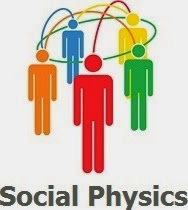How intelligent groups discover and learn from new ideas
In his new book Social Physics, MIT data scientist Alex Pentland introduces the discipline of social physics, a big data approach to social science. The discipline focuses mainly on how ideas flow through groups and communities and how social learning takes place to enable productivity and creativity. The book describes much large scale research and many core concepts of social physics and it introduces ideas on how groups, organizations, cities, and societies can be made more effective.
One of the studies described in the book is by Wooley et al (2010). This study has demonstrated the existence of a collective intelligence which is different from the individual intelligence of each group member. This collective intelligence turns out to depend mainly on two factors: 1) the equality of conversational turn taking: the less conversations were dominated by a few people only, the more intelligent the group was, and 2) social intelligence: the ability to read each other's social signals.
In a later analysis of the study's data, Wen and Pentland (2011) found that the pattern of idea flow was most important for group performance. The highest performing groups had the following characteristics:
One of the studies described in the book is by Wooley et al (2010). This study has demonstrated the existence of a collective intelligence which is different from the individual intelligence of each group member. This collective intelligence turns out to depend mainly on two factors: 1) the equality of conversational turn taking: the less conversations were dominated by a few people only, the more intelligent the group was, and 2) social intelligence: the ability to read each other's social signals.
In a later analysis of the study's data, Wen and Pentland (2011) found that the pattern of idea flow was most important for group performance. The highest performing groups had the following characteristics:
- Many ideas: in the group many very short contributions were made (rather than a few long ones)
- Dense interactions: a continuous, overlapping cycling between making contributions and very brief responsive comments
- Diversity of ideas: everyone contributed roughly equally in ideas and reactions
In addition to this, two things are required for teams to be creative: 1) a process for idea discovery (exploration) and 2) a process for selecting useful ideas and translating them into new norms and behaviors (engagement). The most effective teams appear to be alternating (oscillating) between phases of exploration in which team members interact with people outside of the team and phases of engagement in which team members closely interact with each other.

Comments